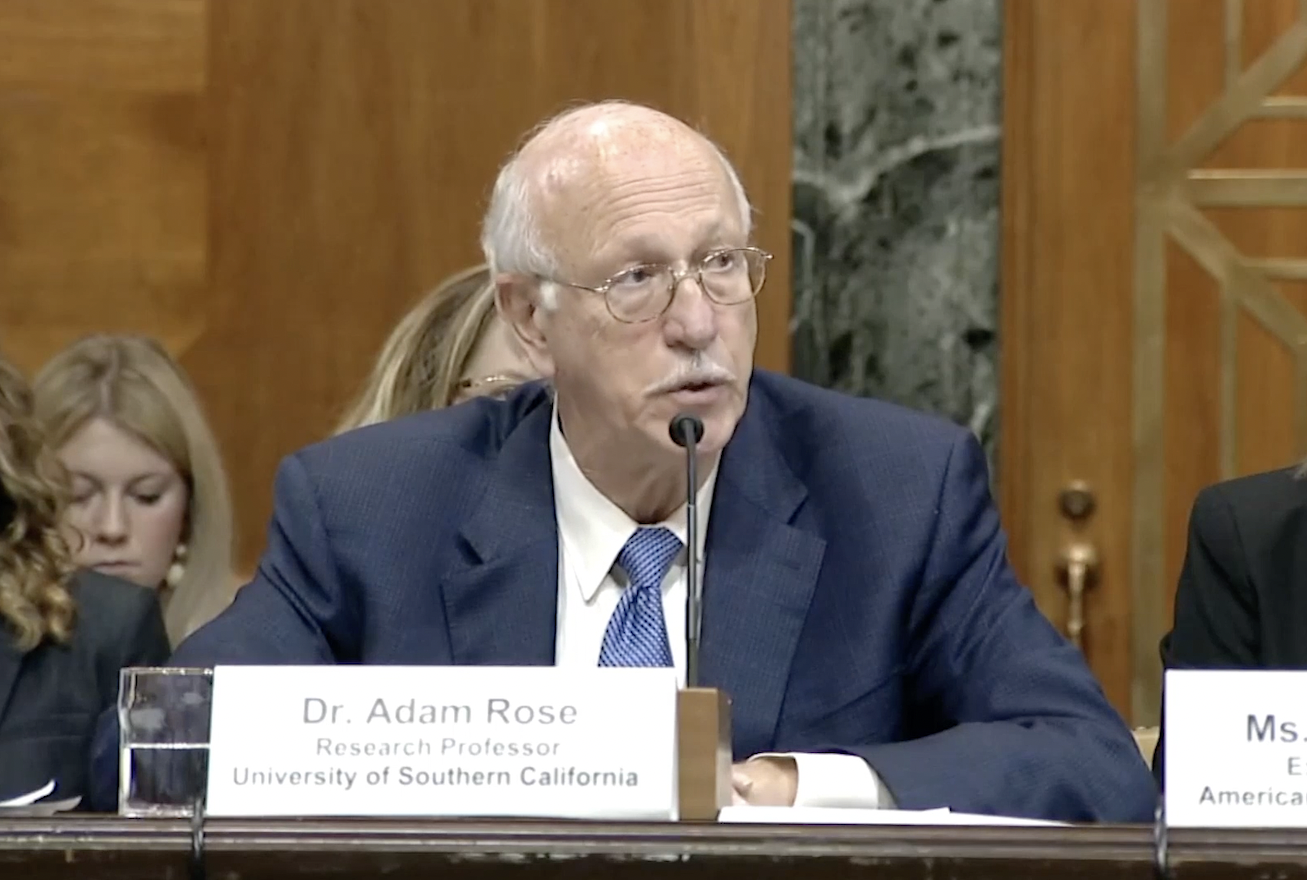

Dr. Rose in front of the Senate Budget Committee
CREATE Senior Research Fellow and USC Price School Research Professor, Adam Rose, presented testimony to the U.S. Senate Budget Committee on October 25, 2023, at a hearing on Bottlenecks and Backlogs: How Climate Change Threatens Supply Chains.
His prepared remarks emanated from research sponsored by one of CREATE’s sister centers — the Center for Accelerating Operational Efficiency (CAOE) — on Modeling the Economic Impact of Complex, Multi-Vector Disruptions to the Marine Transportation System and Supply Chains. Professor Rose serves as a PI of the project with Fred Roberts, Director of the DHS Command, Control and Interoperability Center (CCICADA). Other major contributors to the project include former CREATE post-doc and current Associate Professor at The Ohio State University, Zhenhua Chen, and retired U.S. Coast Guard Captain, Andrew Tucci.
The study simulated the economic impacts of a potential compound disaster consisting of:
1. Record low water levels on the Mississippi caused by drought
2. A lock and dam failure near St. Louis potentially caused by water and heat stress
3. An import supply disruption at the Port of New Orleans potentially caused by a climate-related phenomenon such as a severe hurricane.
The analysis focuses on the fertilizer market and crop production, primarily negatively affected by barge rate increases and productivity losses stemming from low water levels and shipping delays. This disaster is estimated to result in an annual loss of US GDP of more than $18 billion, employment loss of 51,000, and consumer price index increase of 0.25 percentage points. Agricultural commodities are estimated to incur even higher price increase, and most of the adverse effects would be felt by the five Upper Mississippi River States, though further negative impacts would reverberate throughout the US economy [1].
This research is the most recent of several supply-chain analyses Professor Rose has performed over the past several years. These include a study of the supply-chain impacts stemming from a California tsunami [2], supply-chain impacts relating to petroleum trade from a disruption of the Port Arthur/Beaumont complex in Texas [3], two studies of disruptions of parts of the Los Angeles/Long Beach [ 4 & 5], and an analysis of the supply-chain ramifications of a cyber-attack on the Detroit automobile industry [6]. Rose is currently working on another supply-chain study for the Defense Advanced Research Projects Agency (DARPA) that focuses on critical materials, in which he is combining survey research and agent-based modeling to adjust the parameters of a computable general equilibrium (CGE) analysis model to reflect heightened resilience to disruptions of critical materials.
Rose typically uses CGE analysis in these studies, since this modeling approach characterizes the economy as a set of interrelated supply chains. The methodology is the cornerstone of the Economic Consequence Analysis Framework that Rose has developed for studying the economic impacts of natural and man-made disasters [7]. The framework incorporates aspects of resilience and exaggerated behavioral responses that distinguish it from ordinary economic impact analysis. The framework has previously been applied to such major events as the World Trade Center Attacks, a hypothetical major Southern California earthquake [8], and COVID 19 [9].
In addition to his prepared remarks, Professor Rose engaged in a lively discussion of climate change issues more broadly with members of the Senate Committee. He stated that the vast majority of climate scientists have concluded that climate change is a serious and imminent threat. He also emphasized that mitigating greenhouse gas emissions is not likely to be as costly as many believe, because businesses have typically found ways to innovate in the face of environmental regulations and because policy instruments such as cap & trade facilitate addressing the issue in a least-cost manner across sectors and countries [10 & 11].
References
1. Rose, A., Z. Chen, F. Roberts and D. Tucci. 2023. “Economic Impacts of Agriculture Disruptions on the Mississippi River Due to Climate Change,” CREATE, USC.
2. Rose, A., I. Sue Wing, D. Wei, and A. Wein. 2016. “Economic Impacts of a California Tsunami,” Natural Hazards Review 17(2): 04016002. doi.org/10.1061/(ASCE)NH.1527-6996.0000212
3. Rose, A., D. Wei, and D. Paul. 2018. “Economic Consequences of a Disruption of Oil Imports: The Role of Seaports in U.S. Energy Security,” Energy Policy 115: 584-615. doi.org/10.1016/j.enpol.2017.12.052
4. Wei, D., Z. Chen and A. Rose. 2020. “Evaluating the Role of Resilience in Recovering from Major Port Disruptions: A Multi-Regional Analysis,” Papers in Regional Science 99(6): 1691-1722. doi.org/10.1111/pirs.12553
5. Wei, D., A. Rose, Koc, E., Z. Chen, and L. Soibelman. 2022. “Socioeconomic Impacts of Resilience to Seaport and Highway Transportation Network Disruption,” Transportation Research D 106: 103236. doi.org/10.1016/j.trd.2022.103236
6. Rose, A. and Z. Chen. 2020. “Resilience to a Cyber-Attack on the Detroit Automobile Industry: A Computable General Equilibrium Approach,” in P. Nijkamp, E. Glaeser and K. Kourtit (eds.), Urban Empires, Heidelberg: Springer, pp. 377-94. https://www.taylorfrancis.com/chapters/edit/10.4324/9780429469978-25/resilience-cyber-attack-detroit-automobile-industry-adam-rose-zhenhua-chen
7. Rose, A., F. Prager, Z. Chen, and S. Chatterjee. 2017. Economic Consequence Analysis of Disasters: The E-CAT Software Tool. Singapore: Springer. doi.org/10.1007/978-981-10-2567-9
8. Rose, A., S. Liao, and A. Bonneau. 2011. “Regional Economic Impacts of a Verdugo Earthquake Disruption of Los Angeles Water Supplies: A Computable General Equilibrium Analysis,” Earthquake Spectra 27(3): 881-906. doi.org/10.1193/1.3610245
9. Walmsley, T. A. Rose, R. John, D. Wei, J. Hlávka, J. Machado, and K. Byrd. 2023. “Macroeconomic Consequences of the COVID-19 Pandemic,” Economic Modelling 120: 106147. https://doi.org/10.1016/j.econmod.2022.106147
10. Cutler, H., M. Shields, A. Rose, D. Wei, D. Keyser, and K. Crofton. 2023. “Regional Economic Impacts of the Los Angeles 100% Renewable Energy Transition,” Climate Policy, electronic preprint.
11. Rose, A., D. Wei, N. Miller, T. Vandyck, and C. Flachsland. 2018. “Achieving Paris Climate Agreement Pledges: Alternative Designs for Linking Emissions Trading Systems,” Review of Environmental Economics & Policy 12(1): 170-82.. https://doi.org/10.1093/reep/rex029
Posted December 1, 2023
